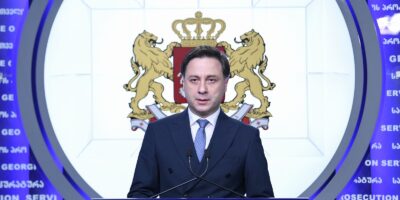Translated by Adrian Baden
Attempt #3
Last June, Georgia passed a Transparency of Foreign Influence law amid mass protests. The law long deemed Russian hasn’t worked, though Georgian Dream only realized this a day ago.
“Dozens of the richest and largest NGOs receiving external funding didn’t register on the list,” concluded parliament majority leader Mamuka Mdinaradze.
Georgian Dream only recently decided to adopt a new version of the law. This time Mdinaradze says the document will be a direct equivalent to America’s FARA (Foreign Agents Registration Act–an act requiring foreign agents to register).
Mdinaradze explained that after the new law comes into effect, last year’s second attempt of the law will be repealed. The deputy refused to discuss other details, simply advising interested parties to familiarize themselves with American legislation.
The majority leader also said that the government will be creating a fund to finance public organizations’ initiatives through changes to grants law. Organizations in the interest of the Georgian people, and not foreign, will be eligible to receive a government grant.
A Disaster or a Better Solution?
The first attempt by the ruling majority to accept a foreign agent’s law was in March of 2023. Members of Georgian Dream and People’s Power submitted two laws to parliament–one on the transparency of foreign influence and the other on the registration of foreign agents. The first law by People’s Power was called Georgian and the second American, supposedly identical to a United States law. NGO and mass media representatives, however, called the deputy’s proposed law a parallel to the Russian law on foreign agents.
Despite protests, the Transparency of Foreign Influence Act was passed quickly during the first reading. The initiative though collapsed under outside pressure as the decision caused mass protests and riots in Tbilisi.
After the unsuccessful first attempt, the presiding party decided to reintroduce the law with a slight change in name, instead naming “organizations representing the interests of foreign states” rather than “agents of foreign influence”.
Despite mass protests, criticism by Western partners, and a fifth veto by President Salome Zourabichvili, Georgian Dream managed to pass the law in parliament. It came into effect in August of last year. The law requires organizations receiving more than 20% of their budget from foreign funding to register on a list. There’s a system of fines in place for refusing to register or submit reports, though the majority of NGOs and media groups have still refused to do so.
Nonetheless, Georgian Dream representatives are positive that their idea for the “Georgian” law is much better than the Russian and American equivalents. For example, in February of 2023, the ruling party leader Irakli Kobakhidze said:
“I can directly say to you as a lawyer and human rights activist that this [American law] is a complete disaster.”
According to Kobakhidze now though, the better solution is a complete copy of the American FARA.
“Already for several years, especially the past two, we’ve talked about the problems now in the open for the new American government. This is a clear indication that foreign financing, particularly American, which has been used in various countries including Georgia, is for organizing revolutions and riots. Foreign-funded NGOs play a crucial role in this. Based on what’s in the open, it’s not only Georgian powers talking about this very serious problem, we can confidently expand legislation related to NGO transparency.”
What does the American FARA Act do?
The American act “on registration of foreign agents” says that if a person (individual or entity) acts under the “order, request, direction, or control” of a foreign principal and as a result engages in political activity (such as attempting to influence government decision, lobbying, or providing political consultation), they must register as a “foreign agent”.
Violation of FARA can result in criminal charges–imprisonment of up to five years and fines up to USD 250 000. In practice, most instances are in cases of deliberate and systemic violation of registration and disclosure requirements.
The law doesn’t provide a “threshold percent” of foreign financing that automatically establishes a person or organization as a foreign agent. Instead of stating a strict numerical limit, the main criterion is activity by “order, request, direction, or control” of a foreign state.
Regarding media, organizations that are owned and operated in the US generally aren’t subject to FARA. But if the publication or media platform receives a large part of its financing from a foreign government or organization or the management or politics of the publication are under foreign influence, then they may be required to register.
Still, FARA is enforced relatively rarely, mainly being used to maintain transparency of political parties using foreign principles. As of April 2024, the US Department of Justice registry totals 518 foreign agents.
Another Law on Media
Following the “Russian” foreign agents law, Georgian Dream decided to teach Georgian journalists “journalism ethics”. Majority leader Mdinaradze announced parliament would introduce a British equivalent law on media.
The act will establish media objectivity and journalistic ethics. Mdinaradze noted that a mechanism to monitor and uphold said standards will also be put in place. According to the deputy, the law will start to be developed today (February 6th).
Mamuka Mdinaradze also added that media funded by foreign sources will be limited, “naturally this doesn’t include revenue from commercial advertising and other similar income”.
According to Prime Minister Irakli Kobakhidze, the media law in Georgia was necessary to stop the spreading of lies and hate which are the main weapons of liberal fascism used by the deep state.
“If someone is scared that they no longer can spread lies and hate, this is clearly their problem. We consider lies and hatred one of the major national challenges for our country and society and therefore need new laws here without any type of censorship or any other infringement of fundamental rights called freedom of media and expression. We are talking about a legislative change that will comply with our constitutional principles as well as international legal norms.”
Vice-speaker of parliament Thea Tsulukiani in an interview with pro-government news channel Rustaveli 2 said that the introduction of the new media law simply means that every citizen will be better protected from false information. Further, Tsulukiani noted if a person commits a criminal offense, then they cannot have the privilege of being a politician or journalist.
“No politician, journalist, or representative of international affairs should have the right to blackmail.”
According to parliament speaker Shalva Papuashvili, the new law doesn’t have anything to do with restricting free speech. Papuashvili recommended that those who don’t like it critique “Great Britain and their embassy”.
“We talk about fake news as a serious problem in the modern world and the devastating consequences it can have. We often see this in Georgia, this struggle with fake news is one of the main goals and objectives of modern democracies.”
Papuashvili also said that misinformation cannot be protected by freedom of speech because “the battle against fake news has nothing in common with free speech”.
Opponents of the ruling party, however, are convinced that Georgian Dream wants to stop protests, silence the media, and put politicians behind bars. The Strategy Agmashenebeli party leader, Giorgi Vashadze commented on this new initiative by the authorities:
“The arrests of political opponents, silencing of the media, attempts to shut people at home – this is the path of a self-proclaimed regime. We need to retaliate with more protests and unity. […] Let Ivanishvili, Kobakhidze, and whoever else think that the steps they’re taking now won’t save them. These people want to establish a dictatorship in the country. I say to them there will be no dictators in Georgia, they will have to submit to the people.”
Irakli Palavandishvili, a member of the United National Movement, shares the same view; “Terror in the name of Georgian Dream will knock on every door,” said the oppositionist.
“The only way to fight a dictatorship is with moral clarity, not sly, deceitful calculations. We are facing the largest capital that exists in Georgia, black Russian money and every resource, Ivanishvili has it all. We need to consider that no other ruler has had more resources,” Palavandishvili stated.
Western politicians are saying that the new media law may harm democracy in Georgia. Namely, European Commissioner for Enlargement and Neighborhood Policy, Marta Kos, on the social media platform X wrote:
“The latest events in Georgia are alarming. The change in legislation by Georgian Dream further harms freedom of speech and citizen’s assembly. We urge the government to change course and return to Georgia’s path to the European Union respecting the Georgian citizens’ will.”
British Media Law
In Great Britain, there is no single statute on media–instead regulation exists through a body of legislative acts, those like the 1990 Broadcasting Act and 2003 Communications Act, as well as the independent regulator Ofcom which ensures compliance with broadcasting standards and protects audience interests.
According to the British model, the media can’t publish unreliable, unverified, or false information and photographs. In cases where incorrect information is distributed, the publication must immediately and properly publish a correction as well as an apology. In addition, citizens and organizations related to the unreliable information have the right to respond.
Journalists are prohibited from using pressure, harassment, deception, or tricks to collect information. They must only receive information and photo materials through honest means, except in important cases where overriding public interests is justified. It is also unacceptable to distort the truth for the sake of advertising or other interests.







